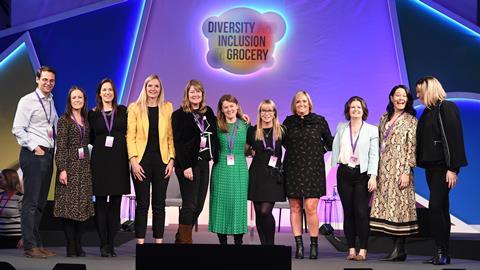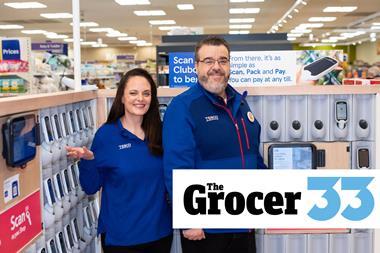At the inaugural Diversity and Inclusion in Grocery event last week industry big hitters shared their advice on how to build a more diverse business
There was a real buzz of optimism at the inaugural Diversity & Inclusion in Grocery event last week.
What had begun as a small idea, to bring together a few engaged men and women to discuss the topic, had morphed into an event attended by just shy of 1,000 people at Wembley Stadium. All were visibly engaged in what they were hearing. From the first coffee there were groups huddled together animatedly swapping stories and personal experiences. Others sat studiously taking notes at afternoon workshops and asking detailed questions of businesses.
It was a day where rival companies removed their armour and agreed, for one day at least, that they shared the same goal. As Louise Stigant, UK managing director for Mondelez International, put it: “As we look out to 2024 we’re facing into a talent gap of about 130,000 people. If we want to attract and retain talent we have to lead the way in D&I, and be open to the broadest population of talent. If we stay where we are, we’ll struggle.”
So, with that in mind, here are six key insights from the day to help all businesses do a better job on diversity.
1. The right thing to do is also a business imperative
We’ve all heard the statistics that prove beyond a shadow of a doubt diverse businesses perform better, record greater profit and make better decisions than those with homogenous teams. But for good measure, many speakers spelled out the business imperative behind D&I initiatives.
Not least as “we live in a world of transparency,” said Jill Standish, senior managing director for retail at Accenture. “Consumers can see who is on your board, they can see the advertising of your products and the type of people that work in your store. If you don’t have an inclusive culture, if you don’t have people that are diverse in your marketing or merchandising department, you might make serious mistakes. And those mistakes can be seriously costly.”
Making the business case also helps bring everyone on board, added Mary Barnard, senior vice president for special projects at Mondelez International. “It isn’t just the right thing to do, but a business priority. Whether about serving consumers, or talent attraction and retention, putting some hard numbers against it has really helped shift the ‘fence sitters’ off the fence. And once you can engage the full organisation you can really start to move things forward.”
2. We all have unconscious biases
Be it in recruitment, management style or how we run meetings, unconscious bias is at play in every facet of a business. “They’re very much part of human nature, but they limit human potential,” said Ranya Shamoon, vice president for babycare Europe at Procter & Gamble. “They create stereotypes about people and about situations so [at P&G] we’re trying to become aware of our biases, and focus not on what separates us but on what brings us together. That’s the way forward.”
This awareness “can lead to very small behaviour changes,” she went on. “Maybe you become a bit more conscious of how long you talk in a meeting and how that limits others from participating. Or maybe you become conscious about finishing a meeting a bit earlier so that parents can go and pick up their kids from school. It’s not rocket science, it’s small gestures, but ones that can really help us move together.”
3. Look again at the status quo
In trying to understand why there weren’t more female store managers at Tesco, its Ireland CEO Kari Daniels held focus groups and spoke to staff to understand what the obstacles were. “We listened to how a single mum would wake her sleeping baby and toddler up at 5am to drive to her mother’s in order to get to the store to open it at 6am. Because that was the job description for a store manager. But it’s perfectly within our gift to think about how other people can open the store and help this lady balance being a great mother with a career at Tesco.”
It demonstrated that “sometimes our structure and legacy processes conspire against an inclusive organisation.”
4. Ask and you might get
Many of the high-profile women on stage recalled examples of asking for promotions, relocations or more flexibility in their roles. Don’t wait to be tapped on the shoulder, advised Barnard. “If you don’t ask you don’t get. Ask for what you want. Sometimes you’ll be surprised how many times you get it.
“Really think about what you want, whether it’s greater flexibility, part-time working, an international assignment – ask for what you want. Particularly for women it’s something we don’t do well enough. We wait to be tapped on the shoulder, we wait for our performance to be recognised and don’t go out there and ask for what we want.”
5. It’s about philosophy, not strategy
At least that’s the approach taken to D&I at Coca-Cola European Partners, said its vice president and general manager Leendert den Hollander. “Like many companies we started with gender diversity. We had a fantastic, well-attended women’s network, and while we made progress we didn’t feel we were moving the needle. The key thing for us was that it wasn’t about diversity alone. It’s about creating a culture where everyone feels they can contribute. So we had to move to a culture of inclusion.”
As part of that, “we tried to identify how it feels, or how we want it to feel, working at CCEP. We came up with the mantra: ‘Be yourself. Be valued. Belong.’ It’s a philosophy, not a strategy. A strategy you can agree or disagree with, a philosophy you can’t. You can’t opt out. If you don’t believe [in the mantra] that’s an issue.”
6. Don’t underestimate the value of mentors
Whether you become one, or find one, a number of speakers spelled out the difference a good mentor can make. For Stigant they “helped me shift from trying to fit in and be what I thought others expected of me, to being me. It’s seeing how the value you bring, and that the difference that you bring, can be where that value is. That helps you, those around you and the businesses you operate in succeed even more.”
Summed up Daniels: “All of us have a responsibility to be role models and mentors and sponsor and nurture the talent coming through our organisations.”

























No comments yet